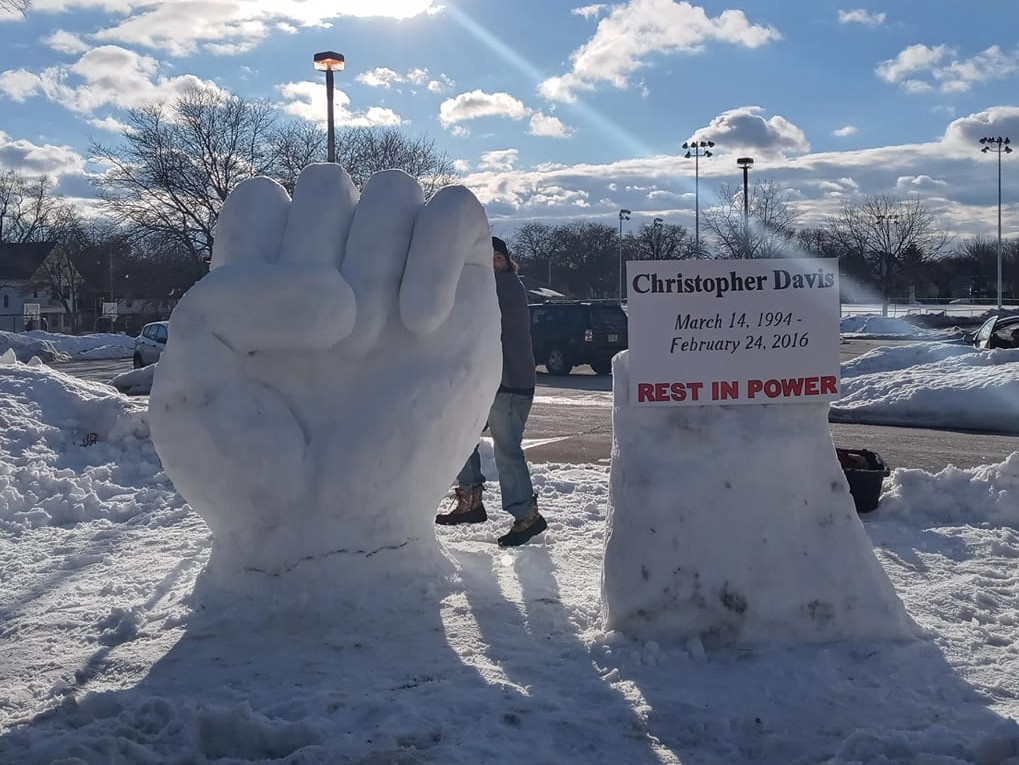On Feb. 25, activists gathered in Milwaukee to celebrate a long-awaited legal victory in the fight for justice for Christopher Davis. Exactly five years after Davis was killed by then Deputy Juan Ortiz, a judge has allowed a civil case brought against Ortiz to go to a jury trial.
The celebration was organized by the racial justice group The People’s Revolution. A massive snow statue was constructed in Davis’ honor and a group of several dozen people marched to the home of Davis’ mother, Doretha Lock, to remember Davis and continue to demand justice.
“We are all still screaming justice for Christopher Davis and I am asking all of you to continue to keep his name in the atmosphere. I am going to continue to say his name as long as I have breath in my lungs,” said Lock as she addressed the crowd that had gathered outside her home to hold a candlelight vigil. “There is too much injustice being done around America … everywhere to our Black and Brown men, and women too. No justice has been served, but where there is no justice, there is no peace.”

On Feb. 24, 2016, Walworth County Sheriff’s officers killed Davis in East Troy, a small town about 30 minutes southeast of Milwaukee during “a staged drug purchase.” (JSonline.com) As the car Davis was a passenger in pulled out of a restaurant parking lot, Ortiz — since promoted to detective — fired wildly at the vehicle, seriously wounding Davis and endangering the lives of countless people in the area. Many of the officers who attempted to confront the occupants of the vehicle, including Ortiz, were in plain clothes and unmarked cars, and had nothing to identify them as police. No drugs were found in the car and the “drug investigation” that police said was ongoing at the time of the killing was based on information from a confidential informant who was trying to get his own charges reduced. (JSonline.com)
District Attorney Dan Necci dismissed calls from Davis’ family to prosecute Ortiz, stating that Ortiz’s shots into a moving car were, “privileged as acts of defense of himself,” and “that there is no other logical conclusion that can be drawn from the evidence other than that Deputy Ortiz was attempting to prevent himself from being attacked.” (WISN.com) While Ortiz claims that he could have been hit by the car in which Davis was a passenger, the dashcam footage from Ortiz’s cruiser was damaged, leading to claims that it was intentionally tampered with to cover up evidence. (JSonline.com)
“A lot of times we get so caught up in grief that we don’t tend to speak out. It’s been five years and we haven’t gotten any answers. It means so much that we have people rallying around us even when we feel like we are stuck,” said Polara Davis, Christopher Davis’ sister. “This isn’t just for Christopher. This is for anybody that has been killed at the hands of a police officer, people that have been abused at the hands of a police officer, people just dealing with racial inequality. Chris was just the starting point for me because it didn’t make it real until my brother got killed.”
The day after the action, a hearing was held to reopen the case of Jay Anderson, who was killed on June 23, 2016, by then Wauwatosa Police officer Joseph Mensah, now employed by the Waukesha Sheriff’s Department. Mensah is also responsible for the deaths of Antonio Gonzales, just 11 months earlier, and Alvin Cole in February 2020. Anderson had been sleeping in his car in the parking lot of a public park, having stopped there after deciding he was too intoxicated to drive.
Subpoenas have been issued to Mensah, soon-to-be-retired Wauwatosa Police Chief Barry Weber, who commended Mensah as “an excellent police officer” after Mensah’s third killing, and several witnesses who had been with Anderson shortly before his death, but who were never interviewed by police or District Attorney John Chisholm. (WISN.com)
“The last thing I said to him was, ‘I’ll talk to you tomorrow, be safe,’” testified Anderson’s brother in-law Hakim Fudge, who had been out drinking with Anderson the night of his murder. Fudge said that the park where the murder occurred was a spot where Anderson “liked to go to think and have alone time.” (TMJ.com)
“This was in no way a reasonable shooting,” said retired sheriff’s deputy and police expert witness William Harmening, when he took the stand. (Fox6Now.com) Harmening went on to debunk the narrative of Mensah, the Wauwatosa Police Department and Chisholm, who found that the shooting was justified on the basis of Mensah’s claim that Anderson reached for a gun. “He didn’t shoot Mr. Anderson because he reached for a gun. He shot him because he lost sight of his right hand, that’s the bottom line,” Harmening definitively stated. (TMJ4.com)
Activists have been ramping up calls for justice for Mensah’s three victims —Gonzales, Anderson and Cole — since the summer of 2020, when major uprisings against police brutality and for racial justice occurred. They have vowed to continue demonstrations demanding justice for Davis, Anderson, Gonzales, Cole, and the many others who have been killed and abused by Milwaukee area police.





